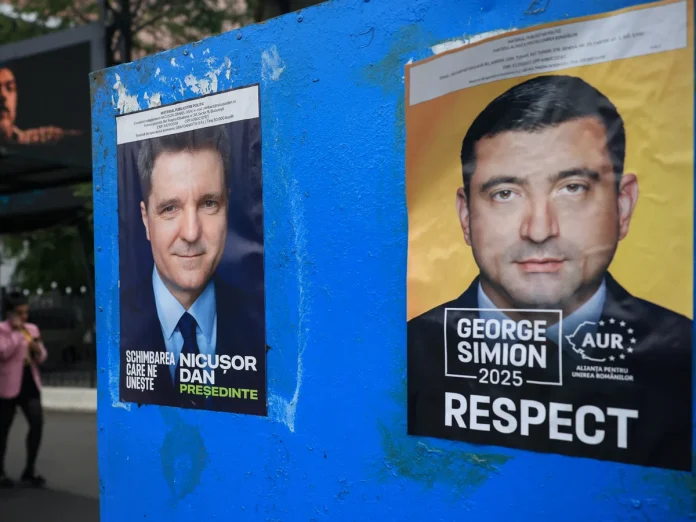Romania is in the midst of its second-round presidential election. The two candidates are George Simion, leader of the far-right AUR party, and Nicusor Dan, the liberal mayor of Bucharest.
This election follows the annulment of Romania’s previous vote last year. Allegations of Russian interference led to the disqualification of the leading candidate, nationalist Calin Georgescu. Some Romanians were relieved by the decision, while others were frustrated that their votes had been invalidated.
Now, six months later, Romania faces another pivotal election. Simion, a former football casual turned nationalist, won the first round on 4 May by a significant margin. He now faces off against Nicusor Dan, a centrist candidate known for his work as Bucharest’s mayor.
The stakes are high. This election could determine whether Romania stays aligned with the European mainstream or shifts towards a more isolationist and nationalist path. Romania is a member of both NATO and the European Union (EU), but Simion’s platform has raised concerns about the country’s future relationship with these institutions.
A nation divided
Voting began early in the morning and will end later in the day, with exit polls to follow. The country is clearly divided, and many voters are uncertain about which direction Romania should take. Simion and Dan both cast their votes on Sunday. Simion said he wanted Romania’s future to be decided by Romanians alone. In contrast, Dan emphasised the importance of Romania’s cooperation with its European partners.
Polls have been close, with many regions showing strong support for both candidates. In Teleorman County, one of Romania’s poorest areas, Simion received 57% of the vote in the first round. This shows the growing appeal of his anti-establishment message. The county, long dominated by the social-democratic party, has seen a shift towards Simion’s nationalist platform.
Frustration with the establishment
Felicia Alexandru, an expert from Aperio Intelligence, explains that much of Simion’s support stems from frustration with the political establishment. After more than three decades of the same parties in power, many Romanians feel disillusioned by corruption and poor governance. This has led to a desire for change, and Simion has positioned himself as the candidate to challenge the status quo.
Simion’s rise isn’t limited to poorer areas. Even in wealthier regions, many people are turning to him as a way to express dissatisfaction with the political system. Petre Filip, a successful businessman who received EU funding to modernise his dairy firm, is one such example. While he is grateful for the EU support, he feels disillusioned with the current political landscape.
Many of his employees, like Mihaela, a worker at the dairy, support Simion because they believe he is working for the benefit of Romanians. “He’s for the people. He’s for creating jobs and better lives,” Mihaela explains. Simion’s slogan, “Make Romania Great Again,” echoes that of US President Donald Trump, and he shares similar isolationist views, prioritising Romania above all else.
Simion’s positions have sparked debate. While he has expressed strong criticism of Russian President Vladimir Putin’s actions in Ukraine, he has also called for Romania to reconsider its military support for Ukraine. Simion has been banned from Ukraine and Moldova due to his controversial statements regarding territorial claims. His remarks, including criticism of political opponents and foreign leaders, have raised concerns in Brussels.
A contrast in leadership
In contrast, Nicusor Dan presents a more moderate, pro-European vision for Romania. As mayor of Bucharest, Dan has focused on tackling corruption and improving governance. His campaign stresses the importance of Romania’s continued membership in the EU and NATO, and he remains committed to Romania’s international alliances.
Roxana, who runs a factory making military uniforms for an EU country, supports Dan. She is concerned about the potential consequences of a Simion presidency, especially the impact on Romania’s international reputation and economy. “It’s such a bad image for Romania in Europe. I am ashamed,” she says, citing Simion’s behaviour and controversial statements as a source of embarrassment.
Dan’s supporters highlight his background as a respected academic and his commitment to “honesty” in politics. His election pledge, “I don’t promise miracles, but I promise I will fight,” reflects a more pragmatic approach compared to Simion’s populist rhetoric.
The future of Romania
As Romania prepares to cast its final votes, the outcome remains uncertain. Should Simion win, many fear that Romania could experience political chaos, with potential repercussions for the economy and the country’s relationship with the EU. While some view his candidacy as a challenge to the political establishment, others worry that his rise signals a shift towards isolationism and nationalism that could jeopardise Romania’s future.
In contrast, Nicusor Dan offers a more stable, pro-European alternative. His supporters believe that Romania’s future lies in continued cooperation with the EU and NATO, with a focus on tackling corruption and ensuring prosperity for all Romanians.
Romania will soon decide whether to embrace a future of isolation or reaffirm its commitment to the European mainstream.
